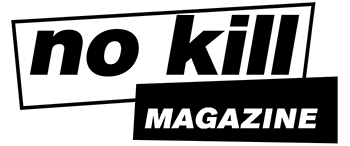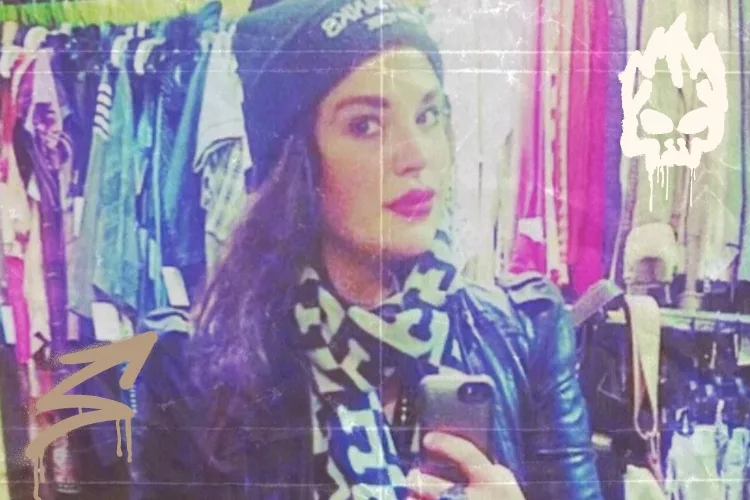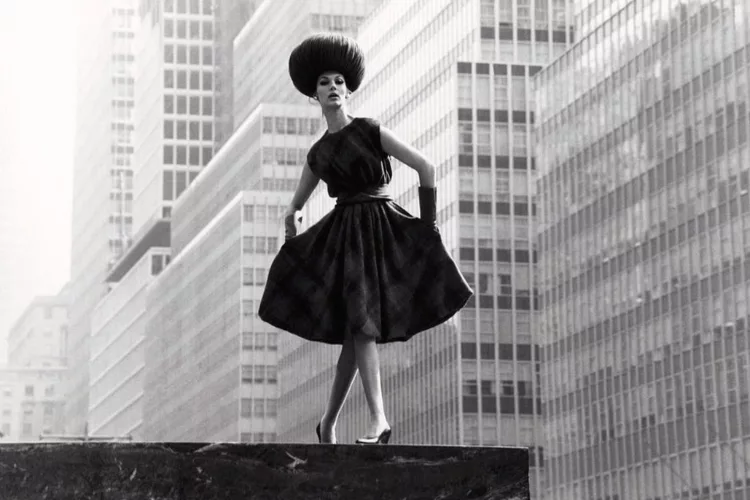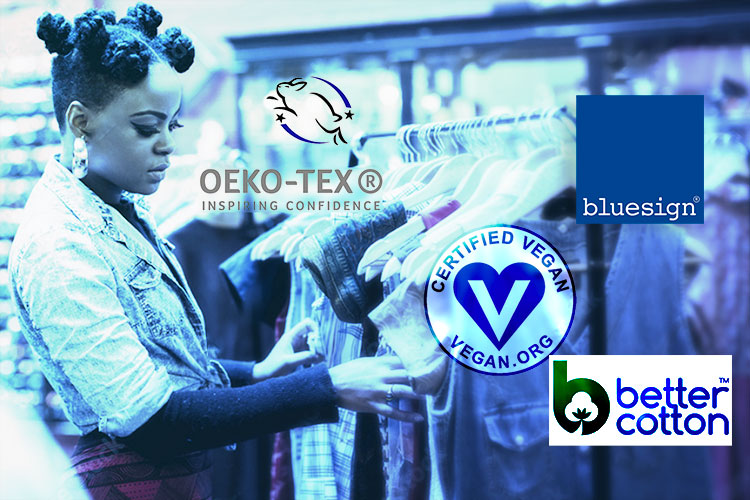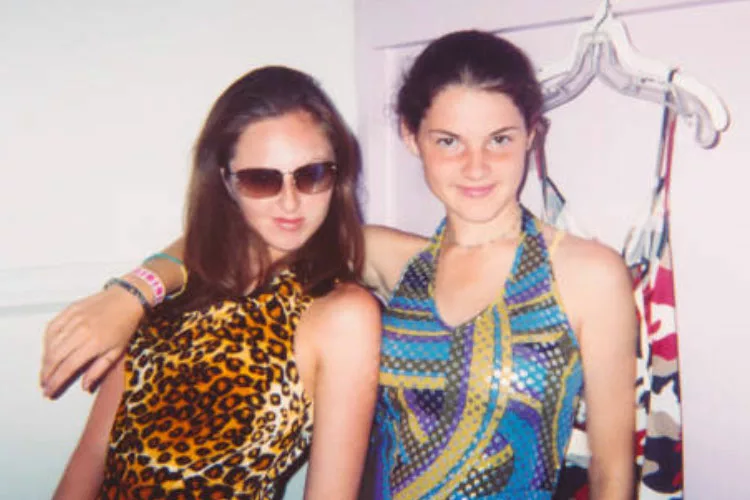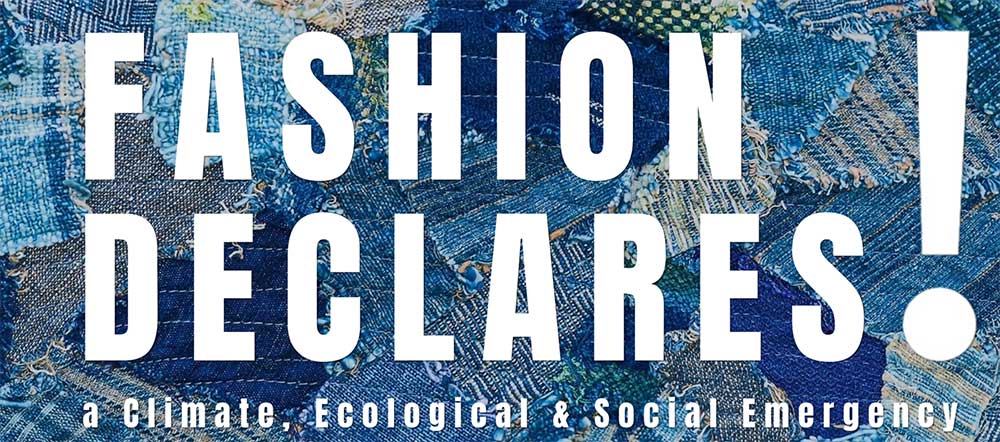
A movement coordinated by REAL Sustainability, Fashion Declares led by Safia Minney has a focus of changing the fashion industry from the bottom up. The founders were inspired by the need for radical behavioral changes within the industry to achieve a more empowering and ecologically viable fashion world. To motivate innovation, an open letter was created to push businesses toward these changes and give people a platform where their voice can be heard. The initiative is inclusive of anyone who wishes to participate and focuses on promoting sustainability and social progress through a regenerative approach to fashion with an emphasis on circularity and fair treatment of workers.
5 Commitments of Fashion Declares
The Fashion Declares open letter is centered around 5 commitments to better the fashion industry spanning environmental social causes. These include:
1. Speaking Out for Urgent Action
- We will speak out for urgent action in the fashion industry to galvanize an industry-wide debate on tackling the climate, ecological and social crisis.
- We do not believe that voluntary agreements are sufficient to address this current crisis. We, therefore, call for fashion leaders to speak out publicly in support of laws and binding, mandatory agreements which hold companies to account, regionally, nationally and internationally, in line with recognised and science-based standards (such as SBTis, UNGPs, SDGs, etc.)
- As an industry, we will promote and share best practices to inspire and support companies to adopt radical and accelerated actions to urgently tackle the climate, ecological and social crisis.
2. Decarbonization, Restoration of Ecosystems & Biodiversity
- The fashion industry must reach net-zero carbon by 2030 through rapid emissions reduction, with minimal and diminishing use of off-setting. We urge a radical cut in the industry’s use of energy, water and toxic chemicals.
- We call for a shift to low impact materials. The industry must cease using virgin synthetic fibres and instead adopt recyclable, biodegradable materials. We urge the industry to use natural materials produced through the principles of Regenerative Organic Agriculture, favoring small-scale and local producers. This will radically promote soil health, restoration of ecosystems, biodiversity, carbon drawdown and the development of carbon-neutral handcraft production. These materials should be independently recognized or certified.
- In line with the circular economy, we call for product longevity and the promotion of resale, rental and repair, to extend the useful life of existing items and so reduce the need for virgin resources. We also call for the recycling and reuse of existing synthetic fibers.
3. Social Justice & The Just Transition
- We demand that the fashion industry treats all workers fairly and with dignity. We will speak out for workers’ rights, a living wage, freedom of association, gender equality, and challenge systemic racism and other forms of abusive power.
- We advocate for adherence to existing best-practice frameworks to protect workers within the supply chain, such as but not limited to Fair Wear, WFTO, and the Modern Slavery Act. We will call for new binding, enforceable and auditable agreements and legislation whenever necessary.
- We call for direct and long-term partnerships with suppliers to invest in the supply chain, community and climate resilience globally. Suppliers are partners in the transformation of our industry and must be active participants in decision-making. We convene thinking and practice on low-carbon, e.g. hand production and craft-based livelihoods at fair wages, towards a Just Transition.
4. Radical Transparency & Corporate Governance
- We demand board-level engagement and role modelling, with all business decisions being assessed with respect to the climate, ecological and social impacts, to put the planet and people alongside profit.
- Companies should know who works in their supply chains and should deliver full public disclosure of tiers 1, 2 and beyond. We demand that companies take responsibility for human rights due diligence and that they ensure living wages for supply chain workers, the right to unionisation, and gender & racial equity. We call for companies to meet their commitments and engage with all stakeholders, not only shareholders.
- We call for standardised industry-wide methodology and measurement criteria, underpinned by a common language and consistent reporting of social and environmental impacts. Companies must pay their fair share of tax, and promote diversity, inclusion and gender equality and stakeholder engagement on boards.
5. The Regenerative Fashion Model
- With rapidly increasing pressure from citizens, employees, investors and the inescapable reality of the climate crisis, brands must acknowledge that the existing economic model based on infinite growth on a planet with finite resources must stop.
- We call for a commitment to transition to a regenerative model for the fashion industry. Fashion can become a positive force for good in restoring our ecosystems, biodiversity and climate, whilst empowering communities, democracy and health.
- We call for all fashion companies to take rapid action immediately to manage their operations within planetary boundaries whilst transforming their models to one that is fair to all.
These clear, actionable steps presented are what really stuck out to make me want to join the grassroots movement. Too often we see vague promises made by companies filled with greenwashing or simply a lack of real action. This isn’t the case with Fashion Declares. Each commitment sets goals that can clearly be measured. The letter urges: emission reduction over offsetting, textile circularity and recycling promotion, binding legislation to protect workers, and much more.
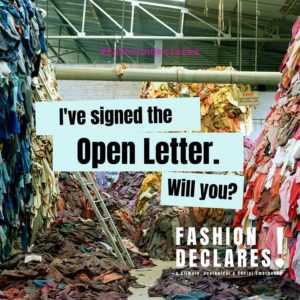
Resources & Education
Fashion Declares also provides tons of free resources. You can learn more about sustainability in fashion or connect with others engaged in sustainable fashion initiatives. Every month there is a webinar by founders Safia Minney and Ben Tulhurst. They show how Fashion Declares is addressing climate, environmental, and social issues. Webinars on business decarbonization, social justice, low impact materials, water pollution, and more are planned through October of this year. Don’t want to wait for a webinar? You can find written tools on these topics and others to explore now on the Fashion Declares website.
Beyond solid goals and accessible education, I was especially excited that Fashion Declares truly encourages anyone who is passionate about positive change within fashion to play their part. So, if you’re ready to join this exciting new effort towards social and eco-responsible fashion, you can add your name to the letter now!
Email: news@realsustainability.org
Instagram
Natalie Labarbera
Related Articles
What is regenerative fashion? Here are our fave brands
Bast Fiber Fashion: Plant Based Brands We Love
Our Favorite Fashion Influencers
5 Books to increase your sustainable fashion knowledge
Sustainable Fashion Organizations and Forums You Need to Know About
